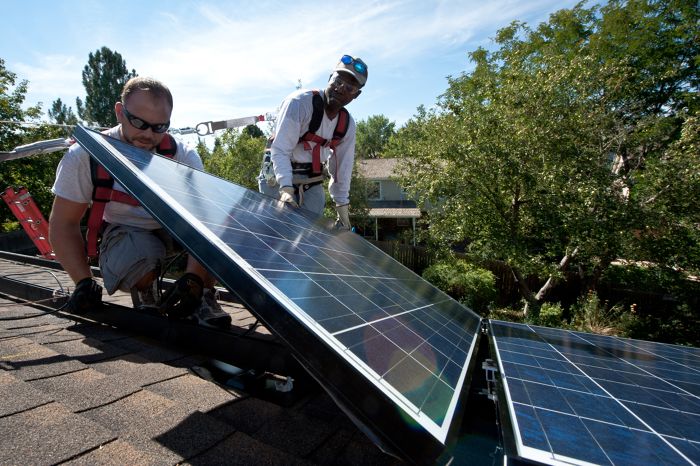
Solar-energy advocates worry that the expiration of a 30% federal tax credit for residential solar systems at the end of 2016 will result in thousands of lost jobs and many fewer system installations. But the country’s two solar trade groups can’t agree on how or even whether to join forces to fight for an extension.
One group, the Solar Energy Industries Association (SEIA), recently asked the Solar Electric Power Association (SEPA) to kick in $2 million for a lobbying effort to retain the income tax credit (ITC), Greentech Media reports. But SEPA said no, citing fears that getting involved in a campaign might threaten its reputation as an “unbiased educational organization.”
Citing documents it obtained, Greentech Media’s Stephen Lacey said that SEIA chief Rhone Resch and board chairman Nat Kreamer wrote a joint letter to SEPA president Julia Hamm expressing their concerns and asking for money to lobby for an extension.
They warned that a failure to keep the credit would mean the loss of 100,000 jobs and a 60% drop in the number of U.S. solar installations. They’re also concerned that a large trade show organized jointly by the two groups, Solar Power International, would suffer.
“Solar Power International, the primary source of SEPA’s budget, would be severely impacted due to a lack of exhibitors, sponsors and attendees,” the letter said, according to Greentech Media. “Our ability to carry out our respective missions would be challenged.”
The appeal wasn’t enough for SEPA.
“While SEPA fully appreciates the impact the ITC has had on the solar industry broadly as well as directly on Solar Power International, the Board determined that funding any elements of an advocacy campaign managed by a 501(c)6 may be detrimental to SEPA’s reputation as an unbiased educational organization,” Hamm replied in an email.
ITC viewed as critical to solar’s growth
The tax credit has helped annual solar installations to grow by more than 1600% since it went into effect in 2006, SEIA says. The credit was extended in 2008, but it will end entirely for residential systems and drop from 30% to 10% for commercial systems unless Congress intervenes by the end of 2016.
“The solar Investment Tax Credit is one of the most important federal policy mechanisms to support the deployment of solar energy in the United States,” the group’s website says. “The ITC continues to drive growth in the industry and job creation across the country.”
The tax credit encourages homeowners to invest in solar equipment by knocking an amount off their tax bills. If, for example, a homeowner invests $10,000 in a photovoltaic system, he or she can deduct 30% of that, $3,000, from taxes owed at the end of the year. An end to the ITC means that solar systems will rise in cost by 30% overnight.
The SEIA says the tax credit is responsible not only for “dramatic” increases in the number of systems that have been installed but also for an 86% growth in solar employment in the last four years and a job-creation rate nearly 20 times higher than overall employment growth.
It also creates “market certainty” for companies, making them feel comfortable with long-term investments in the industry. That spurs technological innovation and lowers costs for consumers, SEIA says.
A difference in outlooks
Although both trade groups are nominally prosolar, they have different missions and are categorized differently under federal tax laws. SEIA is a 501 (c)6 organization, Greentech Media said, while SEPA is a 501(c)3 group–the first a lobbying organization and the latter an organization limited to educational work.
Officers on SEPA’s board of directors all are utility executives, as are many of the directors. SEIA’s board, on the other hand, includes a number of executives with such companies as SunPower Corp., SolarCity, First Solar, and Standard Solar.
Although it’s easy to surmise that the strong presence of utility executives on the SEPA board is what’s driving its lack of enthusiasm for an ITC lobbying effort, Hamm said that nonutility board members also thought advocacy was inappropriate.
Hamm told Greentech Media that SEPA was still thinking about how it might participate in the ITC debate. “We’re certainly not ignoring it,” she said. “We just don’t have an agenda. Not having an agenda ensures that any research we conduct will be credible.”
Read more: http://www.greenbuildingadvisor.com/blogs/dept/green-building-news%2A#ixzz3mb62l6r6
Follow us: @gbadvisor on Twitter | GreenBuildingAdvisor on Facebook
Fine Homebuilding Recommended Products
Fine Homebuilding receives a commission for items purchased through links on this site, including Amazon Associates and other affiliate advertising programs.

Handy Heat Gun

Reliable Crimp Connectors

Affordable IR Camera

Solar advocates fear the scheduled end of a federal tax credit for residential solar systems next year will cost thousands of jobs, but the nation's two trade groups can't agree on how best to convince Congress to extend it.






















